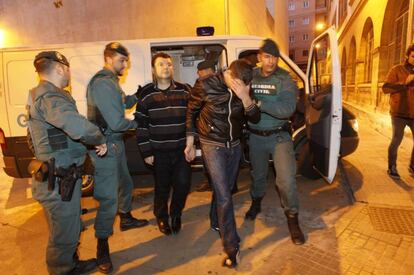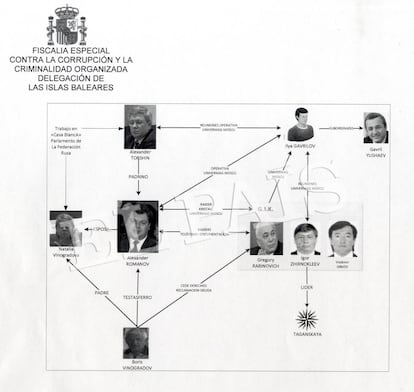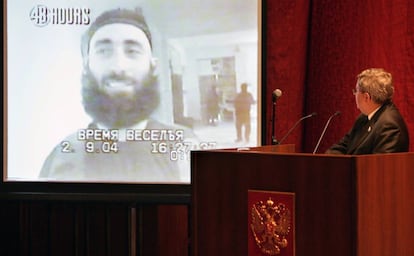The evidence that implicates Trump’s Russian ally with organized crime
Calls from the ex-politician linked to the US president reveal links with a mafia clan in Russia

The 2nd Special Central Unit from the Civil Guard’s Emerging Risks Group spent at least two years recording dozens of telephone conversations between Alexander Porfirievich Torshin, a former Russian senator with close ties to Vladimir Putin and Donald Trump, and his trusted confidante in Spain Alexander Romanov.

A report from the unit, dated June 14, 2016, details 33 different calls, made between August 7, 2012 and May 13, 2013, in which Torshin appears “implicated” in the murky hotel business of Romanov, for which the latter has just been sentenced to four years in prison for money laundering, as well as being forced to return to the state the Mallorcan hotel Mar i Pins in which he invested more than €15 million, using money from the Russian criminal gang known as Taganskaya, a group that has been responsible for blackmailing, extortion and contract killings since the 1990s.
“The godfather can’t buy here because he’s a public servant and it is prohibited,” Romanov said of Torshin
The Civil Guard investigation highlights that the relationship between Torshin and Romanov dates back to the years 1995 and 1998 at the Central Bank of Russia, known as Tsentrobank, when Romanov occupied the role of Director of Representation of the state entity, and Torshin was his immediate boss. Their friendship deepened so much that the Russian ex-politician is the godfather of the son of Romanov, 53, and his wife Natalia Vinogradova, also 53. The latter also knew Torshin during her time in the Russian Senate.
The conversations between Torshin and Romanov and the subordination of the latter toward the Russian politician left no doubts in the mind of the Civil Guard captain who investigated the case and produced a confidential report to which EL PAÍS has had access. This document, entitled “Alexander Porfirievich Torshin in Operation Dirieba,” is not included in the legal case and was handed over to the Spanish anti-corruption public prosecutor. In it, Torshin is identified as the owner of the funds that were laundered in Spain and that had come from the Taganskaya. Torshin took a lot of security measures and would sometimes call from his wife’s phone. In the flow of calls there are also some from the fixed line number 74956925921, which corresponds to his official office as First Vice-chairman of the Federation Council of the Federal Assembly of the Russian Federation. When Romanov was arrested and his house was searched, the address senator@umail.ru used by Torshin was found in his email account. Also found were official documents from the Russian prosecutor.

In the document about the phone calls between Torshin and Romanov written by the Emerging Risks Group there are sentences that reflect the conviction of the Civil Guard investigators that the money laundered in Spain really belonged to Torshin. “The Godfather [as Romanov calls Torshin] cannot buy here [in Spain] because he’s a public servant and it is forbidden” [...] “if the boss buys it [the Mar i Pins hotel] I would like to run it” [...] “The boss gave instructions to buy a hotel because he has two daughters and he wants one of them to inherit it, as well as the share packages” [...] Do you think that the boss wants to buy one or many? For now, he has given me instructions to buy one, because he’s a prudent person and if we are co-owners…,” says Romanov in one of the conversations that was recorded under a judicial order. In others, he states that Torshin is the owner of 80% of the Mar i Pins hotel.
“Analyzing all of the conversations that were monitored since the start of the investigation, it is shown that Alexander Porfirievich Torshin is the person who, from Russia, is directing the money-laundering activities that Alexander Romanov is developing in Spain possibly acting in this way as a front man for the Russian politician both for his investments in Russia as well as in our country,” reads a report dated July 2013 from the official in charge of the investigation, weeks before Torshin announced via telephone his intention to travel to Palma de Mallorca in order to attend the birthday party of Romanov on August 21. It was a journey that he would cancel at the last minute in order to avoid his arrest.
Torshin’s journey to Spain prompted expectations among the investigators and prosecutors because the then-senator had stated that he would be attending accompanied by a number of people who were under investigation. “An operation was set up to arrest him, and a public prosecutor even stayed on call because the rest were on vacation,” explains a judicial source. When the flights arrived from Russia without Torshin the level of frustration was huge. “Since then the tone of the phone messages from Torshin changed radically. He knew that we were after him,” a source from the investigation explains. Sources from the Anti-Corruption Prosecutor have confirmed that the Attorney General’s Office had given its agreement for the arrest, but they suspect that there was a leak and the then-Russian politician decided that it was too risky to travel to Spain.

The impossibility of arresting the Russian politician and the impossibility of the authorities in his country handing him over were he to be prosecuted cooled interest in continuing to go after him, according to several judicial sources. “The main objective was to get back the hotel,” a source from the investigation explains. “Going after Torshin would have delayed the case for a long time and the chances of success were zero given that Russia was not going to collaborate. Without Torshin here there were no guarantees that it would be heard.”
The appearance of Alexander Torshin in this case generated tension and unease among those responsible for the Civil Guard investigation and some of its leaders in Madrid, who raised objections about the arrest of Torshin were he to step onto Spanish soil.

Romanov’s defense verbally conveyed to the prosecutor that Torshin would appear as a witness in the trial held in Palma de Mallorca, according to sources from the Anti-Corruption Prosecutor, but in the end that was not suggested. “We think that if he came he would likely have stayed here definitively,” a judicial source explains. “They did suggest Rabinovich and another two Russian mafiosos who appear in the legal case as witnesses, but who obviously didn’t attend to testify.”
Romanov was sentenced last May to two years in prison and a fine of €4.2 million for money laundering, to one year and nine months for ongoing document fraud and a daily fine of €100 for 12 months for the offense of disclosure of secrets. His wife, Natalia Vinogradova, and another seven associates were given lesser sentences. Thanks to a deal that saw Romanov return the hotel to the Spanish state, the Anti-Corruption prosecutors José Grinda and Juan Carrau withdrew the charges against him of belonging to a criminal organization. The Mar y Pins hotel was auctioned off several weeks ago for €12.6 million, a sum which will go to the state.
English version by Simon Hunter.
The Taganskaya: terror and contract killings
Alexander Romanov, the supposed front man for Alexander Torshin in Spain, was a protagonist in one of the most famous operations of the Taganskaya criminal organization, a mafia group specializing in forcibly acquiring companies via blackmail, extortion and even contract killings. Romanov joined the Kristall alcohol company as a director after an armed confrontation with the former management board. At that encounter Romanov counted on help from the security company Monolit, which was set up by two members of the Taganskaya. Using his powers as general director, he siphoned off funds from the company, for which he was eventually sentenced to three years and six months in prison, according to information given to the Spanish justice system by the Russian authorities themselves.
The Taganskaya have been operating in the Moscow region since the 1990s. Its members choose companies that they want to take control of, something that they then achieve via a "combination of a diverse range of tactics, which requires the involvement of lawyers, public workers and corrupt police officers, economists and other professionals," according to the indictment from Spanish prosecutors. They are estimated to count on around 50 members and to have carried out the contract killings of at least six people, among them Aslan Usoyan, alias Abuelo Khasan, a Georgian mafia boss who was shot by a sniper in the doors of a restaurant. Some of the directors of the companies of which they have taken control have been killed or have received death threats, forcing them to leave Russia.
Tu suscripción se está usando en otro dispositivo
¿Quieres añadir otro usuario a tu suscripción?
Si continúas leyendo en este dispositivo, no se podrá leer en el otro.
FlechaTu suscripción se está usando en otro dispositivo y solo puedes acceder a EL PAÍS desde un dispositivo a la vez.
Si quieres compartir tu cuenta, cambia tu suscripción a la modalidad Premium, así podrás añadir otro usuario. Cada uno accederá con su propia cuenta de email, lo que os permitirá personalizar vuestra experiencia en EL PAÍS.
¿Tienes una suscripción de empresa? Accede aquí para contratar más cuentas.
En el caso de no saber quién está usando tu cuenta, te recomendamos cambiar tu contraseña aquí.
Si decides continuar compartiendo tu cuenta, este mensaje se mostrará en tu dispositivo y en el de la otra persona que está usando tu cuenta de forma indefinida, afectando a tu experiencia de lectura. Puedes consultar aquí los términos y condiciones de la suscripción digital.








































